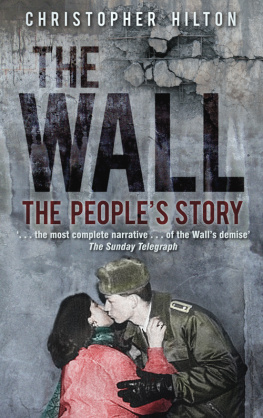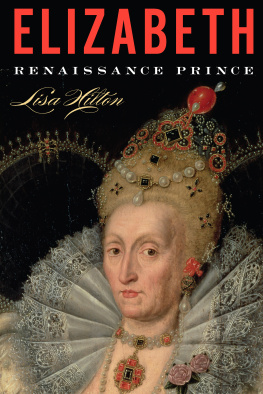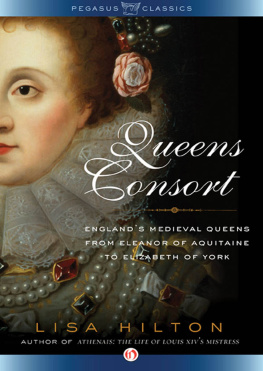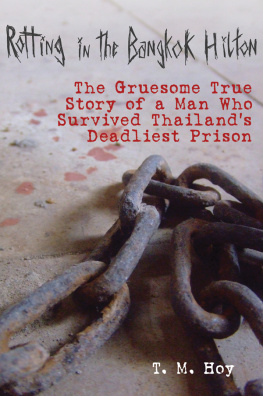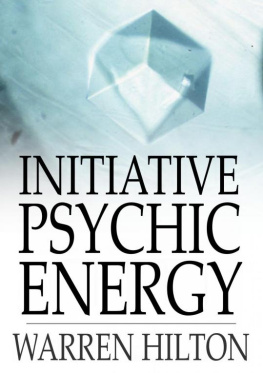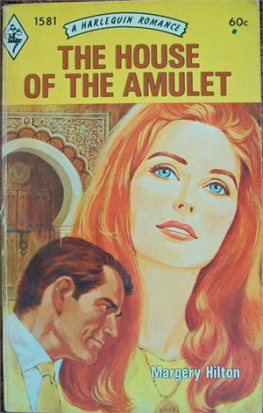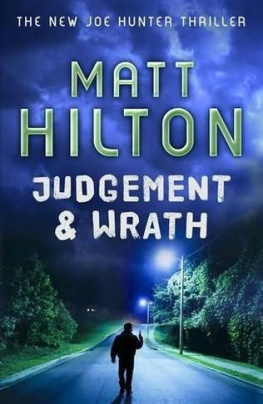Hilton - The wall: the peoples story
Here you can read online Hilton - The wall: the peoples story full text of the book (entire story) in english for free. Download pdf and epub, get meaning, cover and reviews about this ebook. City: Berlin, year: 2014;2011, publisher: The History Press, genre: Politics. Description of the work, (preface) as well as reviews are available. Best literature library LitArk.com created for fans of good reading and offers a wide selection of genres:
Romance novel
Science fiction
Adventure
Detective
Science
History
Home and family
Prose
Art
Politics
Computer
Non-fiction
Religion
Business
Children
Humor
Choose a favorite category and find really read worthwhile books. Enjoy immersion in the world of imagination, feel the emotions of the characters or learn something new for yourself, make an fascinating discovery.
- Book:The wall: the peoples story
- Author:
- Publisher:The History Press
- Genre:
- Year:2014;2011
- City:Berlin
- Rating:5 / 5
- Favourites:Add to favourites
- Your mark:
- 100
- 1
- 2
- 3
- 4
- 5
The wall: the peoples story: summary, description and annotation
We offer to read an annotation, description, summary or preface (depends on what the author of the book "The wall: the peoples story" wrote himself). If you haven't found the necessary information about the book — write in the comments, we will try to find it.
The wall: the peoples story — read online for free the complete book (whole text) full work
Below is the text of the book, divided by pages. System saving the place of the last page read, allows you to conveniently read the book "The wall: the peoples story" online for free, without having to search again every time where you left off. Put a bookmark, and you can go to the page where you finished reading at any time.
Font size:
Interval:
Bookmark:

ONE |
TWO |
THREE |
FOUR |
FIVE |
SIX |
SEVEN |
EIGHT |
NINE |
TEN |
ELEVEN |
Mine is not a pleasant story, it does not possess the gentle harmony of invented tales; like the lives of all men who have given up trying to deceive themselves, it is a mixture of nonsense and chaos, madness and dreams.
Demian,
Hermann Hesse
Demian, Hermann Hesse (Panther Books Ltd, London, 1969).
1.The wall, cutting across central Berlin
2.The divided Germany
3.Districts surrounding Berlin
4.Bernauer Strasse
5.The Teltow Canal
6.The River Spree
7.Exits and Entrances
8.The death of Peter Fechter
9.Tunnel 57
10.The Steinstcken enclave
11.The gateways to the West
12.Checkpoint Charlie
A ny book like this, balancing political and historical background against the first-person testaments of the foreground, draws to itself a lot of people and a lot of sources of information. I pay my due tribute to them all and offer my sincere thanks.
First, Birgit Kubisch, who started off as an interpreter but became an enthusiast, an organiser, a translator, a provider, and handled some interviews herself. To her I must add my neighbour Inge Donnell who moved doggedly through translating the paragraphs of those who died at the wall even though she found the task upsetting; and to her I must add Viktoria Tischer, of Haynes, who set herself to add to the store of knowledge on Peter Fechter, the teenager whose fate he was left to bleed to death in 1962 still lives, if I may use that word, in the domain of the grotesque and the barbarous which the Berlin Wall created.
I list the others who helped in no particular order. The book is, I hope, greater than the sum total of its parts and many, many good people provided those parts, each in their own way. To people who insist that civility, courtesy and cooperation are vanished echoes of a genteel past, I say: wrong. Almost nobody I approached in so many walks of life was difficult. On the contrary, and for no reward of any kind, they went out of their way to help.
I owe a special debt to Hagen Koch, a former Border Guard who has, in his cosy East Berlin apartment, set up a museum to the wall because he feels there should be one place where people can find out about it. He has refused a great deal of money for some of the material hes gathered (including a unique set of photographs of the death strip) and I salute him for that as I thank him for maps, information, and advice. If you want to see for yourself, try http://www.berliner-mauer.de . The Rt Hon. Lord Hurd of Westwell CH, CBE , then British Foreign Secretary, sent specific memories which were gratefully received. Millie Waters, a bubbly public affairs specialist at the HQ US Army, Europe, proved to be a one-person army in finding people and arranging things.
And thanks to the interviewees: Chris Toft, British Military Police; Bernard Ledwidge, British Military Government, Berlin; the late Diana Loeser, who lived in East Berlin; Bernie Godek, Michael Raferty, Bill Bentz and Russ Anderson of the US military; former US Secretary of State Dean Rusk, Frank Cash, Dorothy Lightner (wife of Allan), the late John Ausland, George Muller, Al Hemsing, Richard Smyser and Frank Trinka of the US political and diplomatic services; Adam Kellett-Long (with particular thanks to his wife Mary who allowed me to use extracts from her diary), Peter Johnson (who also let me have his diary) and Erdmute Greis-Behrendt, of Reuters; Gnter Moll and Roland Egersdrfer of the Border Guards; Peter Schultz and Ernest Steinke of the RIAS radio station, Berlin; Peter Dick, a Canadian and briefly a West Berlin resident; Peter and Daniel Glau of the Hotel Ahorn, which became a second home; Ekkehard Gurtz, Gerda Stern, Bodo Radtke, Nora Evans, Mateus, Kurt Behrendt, Heinz Sachsenweger, Uwe Nietzold, Erhard and Brigitte Schimke, Lutz and Ute Stolz, Rdinger Hering, Klaus-Peter Grohmann, Martin Schabe, Horst Pruster, Birgit Wuthe, Jakob Burkhardt, Elli Khn, Pastor Manfred Fischer, Marina Brath, Astrid Benner, Brita Segger, Katrin Monjau, Harald Jger, Hartmut Richter, Janet and Jacqueline Burkhardt. E.L. Gordon kept watch on the US media. A friend and fellow enthusiast, John Woodcock, was a valued companion on trips to the city.
There is a Bibliography at the end, but for permission to quote I am indebted to: Edith Kohagen, Editor-in-chief of Presse- und Informationsamt des Landes Berlin for The Wall and How it Fell (1994) and the invaluable Violations of human rights, illegal acts and incidents at the sector border in Berlin since the building of the wall (13 August 196115 August 1962), published in 1962 on behalf of the government of the Federal Republic of Germany by the Federal Ministry for All-German Questions (Bonn and Berlin). She also demystified the time gap between Berlin and Washington in August 1961, something not as straightforward as one might imagine. The extracts from Berlin Twilight by Lieutenant-Colonel W. Byford-Jones (Hutchinson), Man Without a Face by Markus Wolf (Jonathan Cape), Goodbye to Berlin by Christopher Isherwood (Hogarth Press) and The Ugly Frontier by David Shears (Chatto & Windus) are courtesy of the Random House Group Ltd.
I sincerely thank the following for extracts: Aufbau-Verlag, Berlin for Der Sturz by Reinhold Andert and Wolfgang Herzberg; Peter Owen publishers for the quotation from Demian by Hermann Hesse (Panther); A.M. Heath & Co. Ltd for The Ides of August by Curtis Cate (copyright Curtis Cate, 1978); the Orion Publishing Group Ltd for Willy Brandt: Portrait of a Statesman by Terence Prittie (Weidenfeld & Nicolson); Duke University Press for We Were the People: Voices from East Germanys Revolutionary Autumn of 1989 by Dirk Philipsen; Continuum for the German Democratic Republic by Mike Dennis; the History Place ( webmaster@historyplace.com ) for the full text of John F. Kennedys speech in Berlin in 1963; Rainer and Alexandra Hildebrandt for Berlin: Von der Frontstadt zur Brcke Europas and It Happened at the Wall; the University of Massachusetts Press for The Wall in My Backyard by Dinah Dodds and Pam Allen-Thompson; HarperCollins for The Siege of Berlin by Mark Arnold-Forster; Sanga Music Inc. for the lines from Where Have all the Flowers Gone? by Pete Seeger; Norman Gelb for The Berlin Wall (Michael Joseph, 1986); George Bailey for Germans: Biography of an Obsession (Free Press, New York) and Battle-ground Berlin (with David E. Murphy and Sergei A. Kondraschev, Yale University Press); the British Army HQ in Germany (and thanks to Helga Heine for smoothing the way) for the Friday 17 November 1989 issue of Berlin Bulletin, the magazine published by Education Branch, HQ Berlin Infantry Brigade for British Forces, Berlin; ITPS Ltd, on behalf of Routledge, for Eastern Europe in the Twentieth Century by R.J. Crampton; Christian F. Ostermann, Director, Cold War International History Project, The Woodrow Wilson Center for Scholars Project, for Khrushchev and the Berlin Crisis and Ulbricht and the Concrete Rose; the Associated Press for their reporting of escapes and escape attempts in the 1980s.
I owe special thanks to Yorkshire Television, for allowing me to quote verbatim from their emotive and emotional documentary
Next pageFont size:
Interval:
Bookmark:
Similar books «The wall: the peoples story»
Look at similar books to The wall: the peoples story. We have selected literature similar in name and meaning in the hope of providing readers with more options to find new, interesting, not yet read works.
Discussion, reviews of the book The wall: the peoples story and just readers' own opinions. Leave your comments, write what you think about the work, its meaning or the main characters. Specify what exactly you liked and what you didn't like, and why you think so.

